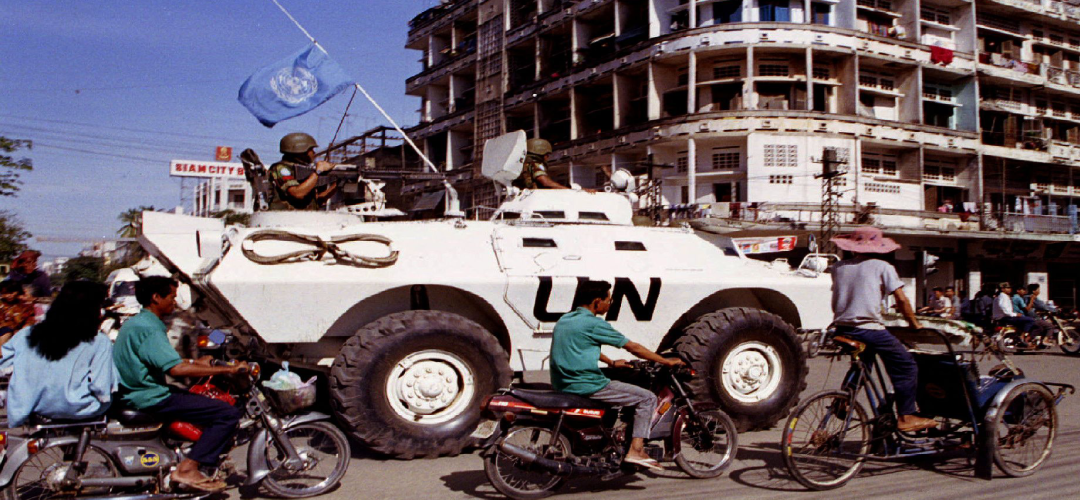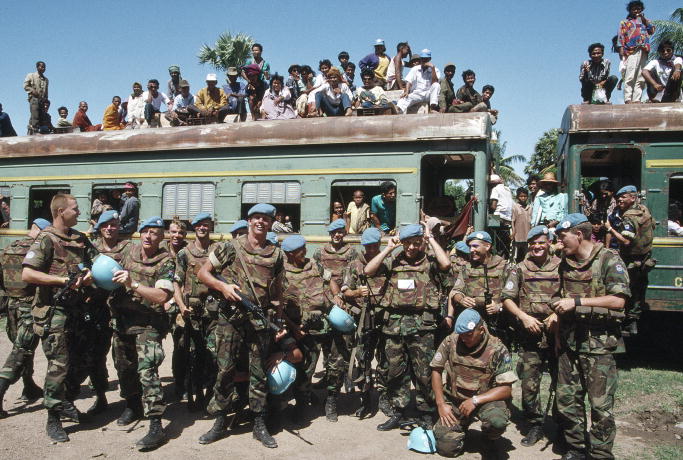The Khmers: Seeking a Revival
October 21, 2023 | Expert Insights

A fact known to few Indians is that the Khmers of Cambodia have a deep connection with India; legends claim that they were born from the union of a Brahmin Kambu and the 'apsara' Mera, thus the name Khmer.
For the world at large, Cambodia is a small and nondescript country 'somewhere in Asia where bad things have happened.' Once called the 'killing fields' in Western media and given a degree of notoriety in the 1984 British biographical film of the same name, Cambodia only pops up in popular news for the wrong reasons. Recently, it was there on account of its elections, which are widely believed to be fixed by the regime led by Hun Sen.
Background
For most of the last three decades, Cambodia has maintained a low profile internationally and avoided getting embroiled in great power geopolitics. However, due to one of the largest international interventions in the post-Cold War world, it has continued to receive substantial and continuous foreign aid.
Once a French protectorate and colony, Cambodia gained its independence in 1953. In the late 1960s, it was drawn into the Vietnam War and the Cold War conflicts. The brutal Khmer Rouge communist regime in Cambodia led by military ruler Pol Pot ended when Vietnam invaded the country in 1978. Hun Sen, once a Khmer Rouge cadre, switched sides and returned with the Vietnamese invasion and participated in the regime backed by Vietnam. At the same time, a deadly insurgency by the unrepentant Khmer Rouge continued to rage in the countryside.
With the end of the Cold War, the external powers financing all sides in the conflicts in Indo-China exited, opening a window for the UN to intervene. With the establishment of the United Nations Transitional Authority in Cambodia (UNTAC), the UN served as the sovereign government of a country for the first time. When the UNTAC was established, India was the leading contributor of UN peacekeepers and military deminers. The UNTAC sought to disarm the different factions and establish a government that could run the country like a modern nation-state.
In the 1993 elections organised by the UN, Crown Prince Ranariddh won but was soon strongarmed into a coalition with Hun Sen, leading the Cambodian People's Party (CPP), after which the UNTAC exited. In 1997, Hun Sen ousted power through a military coup and has won every election since then.

Analysis
The UNTAC arrived in Cambodia with great hopes of building a new nation. While it did not accomplish this aim, it managed to unify the country, disarm the factions, and set up a government backed by millions of dollars contributed by Japan and Western nations.
International aid to Cambodia has continued to be generous. Between the setting up of the UNTAC in 1992 and 2017, Cambodia received more than $20 billion in aid. This was through direct aid as well as loans and grants from countries, international organisations, and private donors. Major donors include Japan, the Asia Development Bank, the U.S. (blamed for trying to bomb the country into a 'parking lot' in the 1960s and use of defoliants), as well as the European Union (EU) and Southeast Asian countries. In 2020, it received $1.37 billion in aid.
This substantial foreign aid has contributed to its development and growth. Between 2007 and 2014, it witnessed a 19.6 per cent annual growth in tourism. Prices have stayed stable, with inflation under 4 per cent from 2015 to 2019. The gross national income rose from $300 in 1994 to $1,380 in 2019. Due to garment exports and tourism, Cambodia's economy grew at an average annual rate of 7.7 per cent between 1998 and 2019. Poverty rates reduced between 2009 and 2019, mainly due to rising earnings. While the COVID-19 pandemic worsened unemployment and poverty, social assistance to poor and vulnerable households was increased to moderate losses in income.
Cambodia has also made considerable progress in health: life expectancy at birth and infant mortality rates have increased significantly between 2000 and 2021. So have access to clean water, electricity, and cellular subscriptions. Literacy increased from 67 per cent in 1998 to 81 per cent in 2015, while school enrolment rose from 17 per cent in 1997 to 97 per cent in 2014. While Cambodia still has a long way to go, the people’s quality of life has improved in terms of key indicators like income, healthcare, and education. In this, the global community can claim some credit.
However, the dream of creating a democracy in Cambodia has long faded. For several years, Hun Sen’s CPP permitted democratic norms to continue. In 2013, when the opposition Cambodian National Rescue Party just missed a win due to irregularities, the CPP changed its approach. Since then, the CPP has maintained its stronghold by eliminating opposition party leaders or having the party disqualified by the courts. The Candlelight Party – the main opposition – was banned in this year's elections. The regime has also quelled independent media and civil society groups. Although Hun Sen has facilitated a dynastic transition to his son Hun Manet (current Prime Minister), the veteran will likely continue to wield power behind the scenes.
The lack of democratic standards has led to criticism and punitive responses from the West, with the U.S. cutting aid due to “setbacks to democracy” in 2018 and the EU threatening economic sanctions. However, punitive responses like these seem to have little effect on the regime since China continues to provide it with extensive economic support. As Cambodia sinks deeper into Chinese debt, it may end up as a Chinese satellite, an eventuality that could bring it into confrontation with its neighbour Vietnam.
Assessment
- From the UNTAC to the generous flow of foreign aid pouring in over the years, international efforts have significantly shaped Cambodia's progress and development. While foreign aid has contributed to Cambodia's development in key areas such as income, health, and education, it has failed to usher in true democracy or weaken the stranglehold of the CPP regime. Hun Sen and his cabal are largely to be blamed.
- As Cambodia increasingly leans towards China and flouts democratic norms, the future of its relations with Western powers is uncertain. While Japan is trying to match Beijing dollar to dollar through grants, loans, trade and investments, the balance is tilted heavily in favour of China. This does not bode well for the stability of the region.
- As part of its Act East Policy, India is also keen to develop stronger economic and cultural ties with Cambodia. Leveraging its ancient cultural ties, New Delhi could play a more meaningful role in preventing the slide of Phnom Penh into the Chinese camp.








Comments